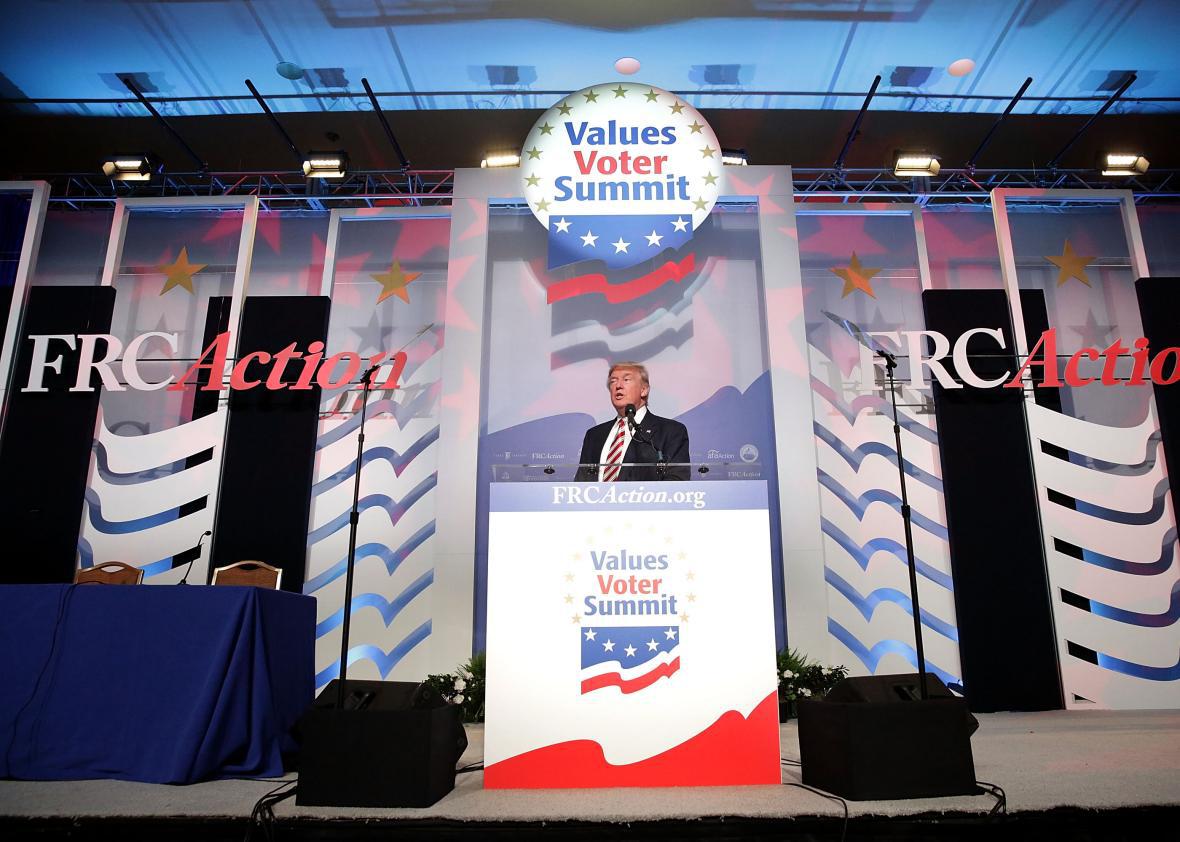Hmm, I wonder what changed:
That finding is buried within a new joint survey from the Public Religion Research Institute and the Brookings Institution that finds Hillary Clinton leading Donald Trump by 15 percentage points among likely voters, 51 to 36. Fifteen points seems high! But I’m more interested in the narrow finding that white evangelicals, long the loudest complainers about a corrosive, sexually liberal society, are suddenly the most likely religious group to believe that some hypothetical vulgar, handsy coastal perv—trying to think of a contemporary example here—can still discharge the duties of public office. Some might see this as hypocritical, which it is. But it’s also a pragmatic move from a cohort not known for its pragmatism. I can respect that.
Social conservatives and their most visible Trump supporters, like Jerry Falwell Jr., have taken a lot of flak this election cycle for staying lock-step behind Trump’s candidacy. Isn’t Trump, the thinking goes, the personification of everything they feel has gone wrong in society? They’ve gotten this flak not just from liberals, whose favorite pastime has long been mockery of social conservatives, but from holier-than-thou Never-Trumpers as well.
Erick Erickson, the staunchly anti-Trump conservative pundit who’s remade himself in recent years into something of Christian preacher, has found himself stunned and dismayed with evangelical leaders who’ve stood by Trump. He sees evangelicals’ widespread support of Trump as “defining deviancy down to justify a political decision,” which rots the strength of the church. “While I think Hillary Clinton will do long term damage to the country, I believe Donald Trump will do far more damage to the church, which must be my chief priority,” Erickson recently wrote. And Michael Gerson, another deeply devout Christian who as speechwriter for President George W. Bush promoted the Iraq war and defended the administration’s use of torture, wrote in a recent Washington Post column that “Trump’s deep support among evangelical Christians is the hardest for me to account for. I wonder how Trump evangelicals explain to their sons and daughters that this man is a suitable leader for a great country.”
We can all agree that after witnessing white evangelical Christians vote so resoundingly for Donald Trump, we never again need to take seriously any claims they have against a Democratic politician for being an insufficiently upstanding, God-fearing role model for children. They can never do that again. This is a good thing, for all parties.
Beyond that, I would defend social conservatives from the criticism they’re getting from liberals and, now, plenty of their fellow conservatives. After years and years of being blamed by the business and foreign policy wings of the GOP for blowing so many elections, evangelicals have become the shrewdest voters in the Republican Party. Their backs are against the wall, and they know it. They’ve lost not just on individual issues like same-sex marriage, but they’ve lost the culture as well. The only thing protecting social conservatives on the federal level was conservatives’ 5–4 Supreme Court majority, and even that was highly subject to Anthony Kennedy’s swing vote—he came through for them on Hobby Lobby but went against them in the far more consequential Obergefell.
If Antonin Scalia is replaced by a liberal, and liberals control the Supreme Court for decades, social conservatism as a big-picture federal political movement is essentially finished. Whatever hope they had of pushing an abortion case to the Supreme Court and corralling five conservatives justices to overturn Roe—always a long shot—is gone. It’s over. Never Trump conservatives frequently argue that Trump couldn’t be relied on to place a sufficiently conservative justice on the court, anyway, but I doubt that would be a problem: All he has to do is greenlight whichever name conservatives point to. Greenlighting a name is one of the few aspects of the presidency Trump is qualified to perform, and it’s the one act that social conservatives need in order to preserve their viability as a national political force. Even if Trump can’t totally be trusted to point at social conservatives’ preferred name, they can trust him more than they can Hillary Clinton. The presidency is about far more than electing a president. They get it.
